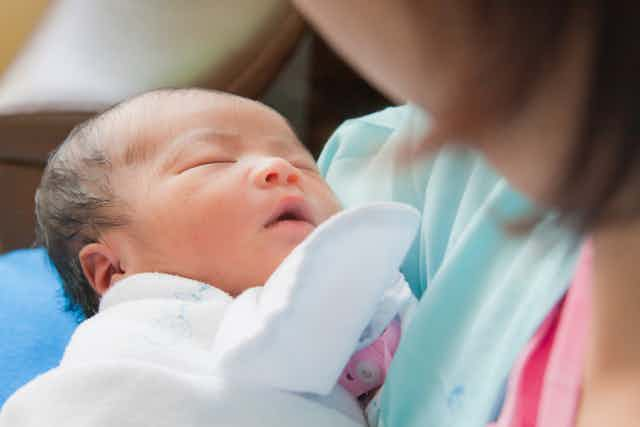Adopting a child can be a difficult and time-consuming process, with few opportunities for local adoptions. The number of adoptions in Australia has declined steadily since the 1970s, with just 45 local adoptions taking place in 2010-11. In the same period there were 215 adoptions from abroad, known as inter-country adoptions.
As a result, adoption lobbyists are turning their attention to children in new countries and in foster care, proposing private systems to make this happen.
On the surface, developing a private adoption agency sounds like a positive step forward. Adoptions would be quicker and prospective parents might have more choice of the country and the child they want. As an added bonus, privatisation would mean shifting costs from the government to the private sector.
But problems arise when adoption becomes the goal to be achieved at all costs, rather than a means to find a family for a child who is unable to be cared for by his or her parents or community.
What’s wrong with privatisation?
Before readers assume this article harbours “anti-adoption” sentiment, let’s take a look at the United States’ privatised adoption system, which is touted to have lots of choice and minimal government involvement. Would-be parents are the customers, so private agencies serve their interests; the emphasis is on speed and meeting demand.
But when these same agencies and brokers also facilitate adoptions overseas or domestically, a conflict arises. Agencies that are paid by commissioning parents visit disadvantaged communities around the world to arrange adoptions. It’s unclear what exactly goes on in these negotiations, but there are many examples of parents overseas not understanding the real meaning of adoption and what will happen to their children.
One of the biggest problems is that US agencies facilitate adoptions in many countries that are not compliant with Hague conventions. Though not foolproof, these conventions provide minimum safeguards against trafficking and some basic requirements around the relinquishment of children, such as informed consent and making every effort to maintain a child in his or her family and community in the first instance. This is called the subsidiarity principle.
Unfortunately these conventions are often overlooked, particularly in countries that are not Hague compliant.

There are also reports of some private North American adoption agencies trafficking children or promoting the loosening of regulations to speed up adoptions from disadvantaged countries. Take Haiti, for example. Following the devastating earthquake in 2010, the country was emptied of its children at such a rate it took a moratorium to stop it. Few countries want to follow the lead of Haiti, Ethiopia and Guatemala and allow private adoption agencies unfettered access to their children.
The numbers of children legitimately available for adoption are also declining around the world. This is due to a greater focus on supporting children in their families or communities, prioritising domestic over inter-country adoptions, or simply applying stricter rules.
Many countries are also concerned about how well their children are protected in private adoption systems. Reuters, for example, recently exposed the devastating outcome for adopted children in the US who were no longer wanted and were “rehomed” on the internet, much like puppies.
The changing face of adoption
No adoption system is perfect, including ours – and especially when it comes to same-sex couples’ eligibility to adopt. But in Australia, adoption is not a service for prospective parents: rather, the child is at the centre of the system.
Not everyone has what it takes to adopt a child. So prospective parents are independently and professionally assessed. They are also adequately prepared for realities of parenting an adopted child – the joy and the struggles, and the long-term commitment this entails. Even though some prospective adopters feel Australia’s rigorous system is an intrusion, this is the very reason we seem to have very few adoption breakdowns in this country.

In future, children likely to be available for adoption will be older with more complex physical or behavioural needs because of the limited availability of babies and the lack of support for families to care for children with disabilities. This places more importance on prospective parents being able to meet such parenting challenges. It also means families and adoptees will need greater support throughout their lives.
Improving support
No matter how positive adoptive families may be, adoptees may still need additional support and information at different times in their lives to ensure their psychological and social well-being. A recent study, for instance, found adopted teens in the state of Minnesota were more likely to attempt suicide than other teens.
As it stands, we still really don’t know the extent of support needed for inter-country adoptees in Australia – there has been a tendency to treat adult adoptees as “perpetual children” and dismiss their experiences.
My colleagues and I hope to answer this question in a national study on post inter-country adoption support. There are thousands of adults who were adopted into Australia as children – we want to hear about the challenges they have faced, the kinds of support and information that has been useful, and what gaps need to be filled.
Inter-country adoption is about meeting the needs of children. We should be very clear about our goals and genuinely involving now-adult adoptees in leading all aspects of adoption policy, practice and service development. After all, it is all about them. This should now be our priority – not moving towards a risky private model of adoption that does not work.
If you’re an adult inter-country adoptee interested in participating in our post-adoption support research, please email p.fronek@griffith.edu.au

